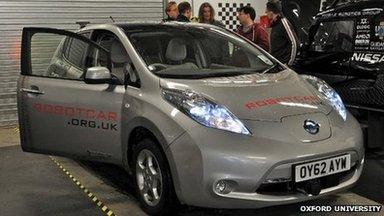Driverless cars to be tested on UK roads by end of 2013
- Published

One robot car is being tested on roads at a science park near Oxford
Driverless cars will be tested on public roads by the end of 2013, says the UK government.
So far, UK trials of the autonomous vehicles have taken place only on private land.
Driverless cars are guided by a system of sensors and cameras and are seen as potentially safer and more efficient than regular vehicles.
As a safety measure, a back-up driver will ride along during tests who can take over in case of emergency.
Test track
The plans have been by the Department for Transport, as part of a ÂĢ28bn investment in British roads to reduce congestion. The report says driverless vehicles are capable of driving on their own "using knowledge of the environment in which they are driving".
"They maintain a safe distance from the vehicle in front at a set speed and without deviating from their lane - all without the driver's input," said the report.
For now, the cars will be driven on lightly-used rural and suburban roads in a "semi-autonomous" mode which gives human passengers the choice to intervene.
They will be tested by the same team of Oxford University researchers who have been developing and testing autonomous car technology on an adapted Nissan Leaf around Oxford Science Park.
The technology uses lasers and small cameras to memorise regular journeys like the commute or the school run.
Prof Paul Newman, who leads the Oxford team, told the ģÉČËŋėĘÖ he was excited by the public trials in the UK. "It's a great area to be working in because it's IT and computers and that's what changes things. The British government sees that engineering is important."
The UK announcement follows public trials in other parts of the world. The US is leading the way, with three states - Nevada, Florida and California - all passing legislation around autonomous cars.
"Far fetched"
Google has led efforts in the private sector, with its fleet of prototypes of a converted Toyota Prius covering more than 300,000 miles on public roads.
Google co-founder Sergey Brin said he believed the self-driving car would "dramatically improve the quality of life for everyone", and that it would be commercially available within the decade.
Prof Newman acknowledged that Google were "trailblazers" but added: "They're not the only game in town."
A Volvo robot car project aims to link vehicles into a 'platoon' that travel together
Although initiatives so far have focused on adapting existing cars, many leading car makers including Ford, Audi and Volvo have also expressed their interest in developing the technology as the cost comes down, potentially paving the way for widespread use in mid-range vehicles.
They link an array of technologies inside the vehicle such as lane keep assist, advanced intelligent cruise control and advanced emergency braking in a so-called "sensor fusion".
Paul Watters, head of roads policy at the AA, urged caution.
"In the past our members have expressed concern about fully autonomous cars, preferring human interaction," he told the ģÉČËŋėĘÖ.
"The notion of reading the newspapers and drinking a cup of coffee is a bit far-fetched. It's early days and driverless cars won't be mainstream for a long time."
"But we have a variety of in-car technologies already, including guided parking and adaptive cruise control, so fully driverless cars will be the culmination of a gradual evolution, not an overnight revolution."
- Published8 July 2013
- Published14 February 2013
- Published1 November 2012
- Published4 October 2012